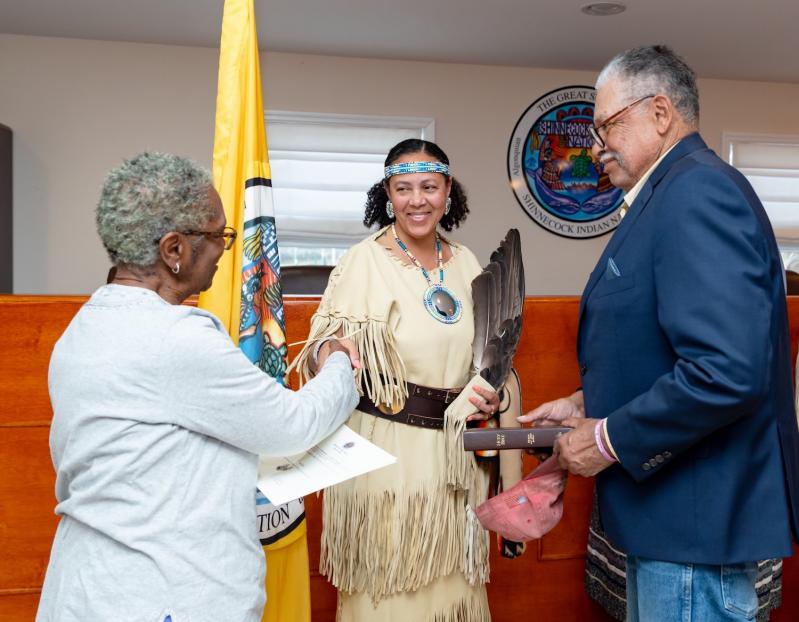From its origins thousands of years ago, to the year 1792 when it first established a council of trustees, Shinnecock was a matriarchal Indigenous culture, traditionally led by women. But in dealing with European settlers who brought with them government structures consisting of male officials, the Shinnecock tribal council immediately reflected its colonial counterparts — all men.
Thus, with the election of Lisa Goree to the role of tribal chairperson on April 2, there’s a woman in charge of the Shinnecock Indian Nation for the first time in centuries.
“This isn’t only Shinnecock history — this is American history,” Ms. Goree said in an interview last week. “This is how it was before. We’ve been here tens of thousands of years, and it was always that way, but we were forced to change our ways so that we could communicate and have agreements and treaties and things like that.”
She isn’t the first woman to serve as a trustee; that distinction went to Nicole Banks in 2013, concurrent with the tribe’s expansion of its council from three to seven members. Since then, a handful of women have served as trustees, but never as the chairperson.
“I don’t feel any pressure because I have a lot of support,” Ms. Goree said. “I’m ready for the challenge.”
She loves to see strong women making headlines. A huge basketball fan, she is particularly thrilled by Caitlin Clark and Angel Reese’s successes in college hoops.
“It is so exciting to see the women taking the forefront,” Ms. Goree said.
Chairperson terms are normally for two years, but Ms. Goree’s time in office will be one year. That’s because Bryan Anthony Polite, her predecessor, resigned mid-term. It was a decision he did not come to lightly, he said in a Facebook announcement.
“I wish Chairwoman Lisa Goree all the best in her new role,” he said after the tribal election results were official.
Ms. Goree brings a wealth of knowledge about land use and economic development from her professional position as Southampton Town’s sole tax assessor, a role she has held since 2013.
She’s worked for the town for 23 years, setting the stage for a positive working relationship with officials at all levels of Southampton management.
She and her husband, Kristin Goree, have three daughters and six grandchildren, all of whom live nearby in houses that he built. Their youngest daughter, Kesi, was the first woman of color to serve on the Southampton Village police force, and later became the first Native American police officer in Southampton Town.
Lisa Goree ran on a platform of inclusivity, particularly for Shinnecock’s elders and youth.
“In going around getting my petition signed by a lot of tribal members, I did meet with a lot of elders, and their concerns were that they don’t feel as though they are made aware of a lot that is going on in the community,” she said. “I’m going to make it my goal that they are more included on things that are going on in the tribe. And our children, too — I will also be committed to making sure that our children stay involved as much as possible.”
Another priority for Ms. Goree is taking care of the approximately 90 tribal members who work in paid positions of administration and support within Shinnecock. “We do have some disparity or inequity in pay, so that is also something that I am interested in working on as well,” she said. “It is why economic development is also important for us. It’s so we can break some of those barriers, making salaries the same as the administrators in some of the local governments, hospitals, and schools.”
She wants to hold regular meetings each quarter with officials in Southampton Town and Village to expand the lines of communication. She wants it to be a two-way street, so that people outside of Shinnecock aren’t taken by surprise when the tribe embarks on new initiatives, and vice versa. She gave this example: “If we know that there are going to be subdivisions or buildings that may be proposed in Shinnecock Hills, we should be included in that process when a permit is filed. We should be made aware of that so that we know the town is following the town code as far as the archaeological studies that need to be done. Those areas are very sensitive.”
Since being sworn into office, Ms. Goree has been attending orientation sessions and meeting with stakeholders. (She also found time to relax on a family vacation that had been previously planned.)
“It’s all still so new. I’m two weeks in, compared to another 50 to go,” she said. “Even if I don’t run again in the future, I just want to be able to see that I’ve been able to make an impact.”




